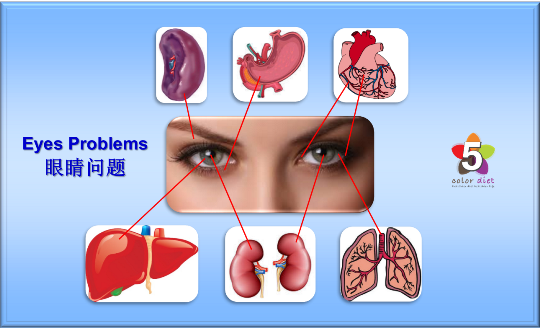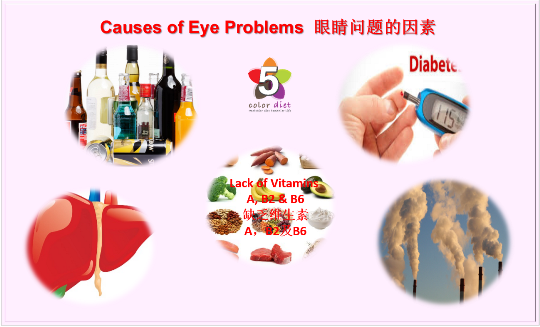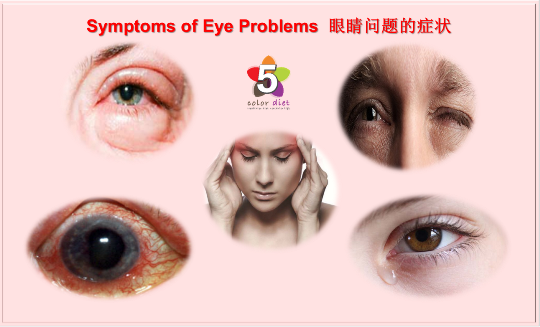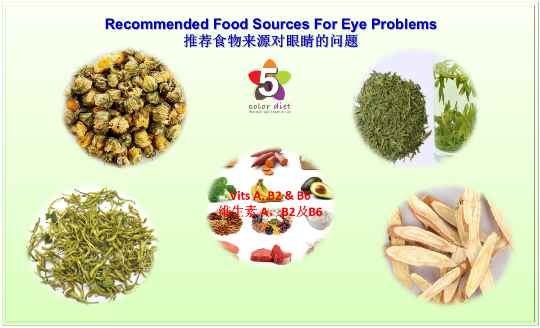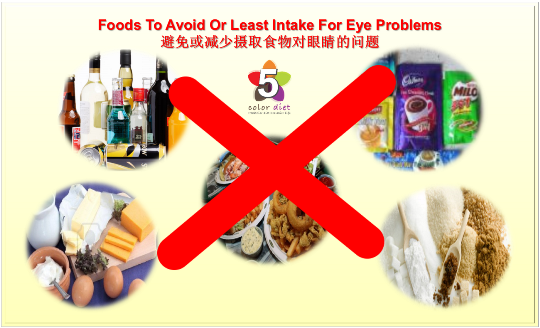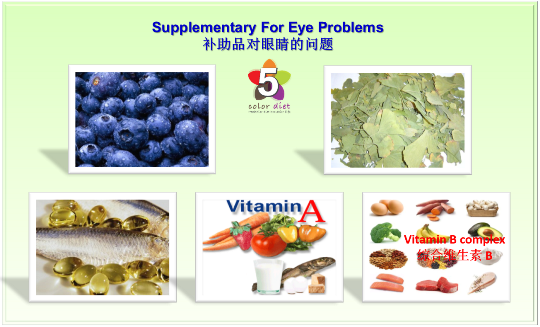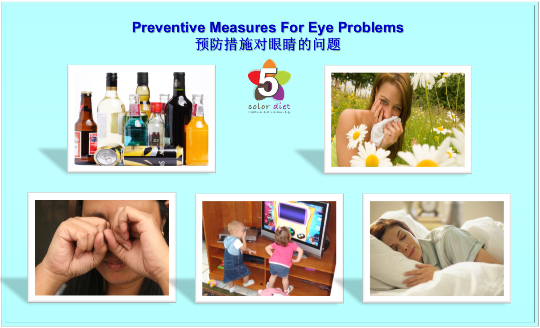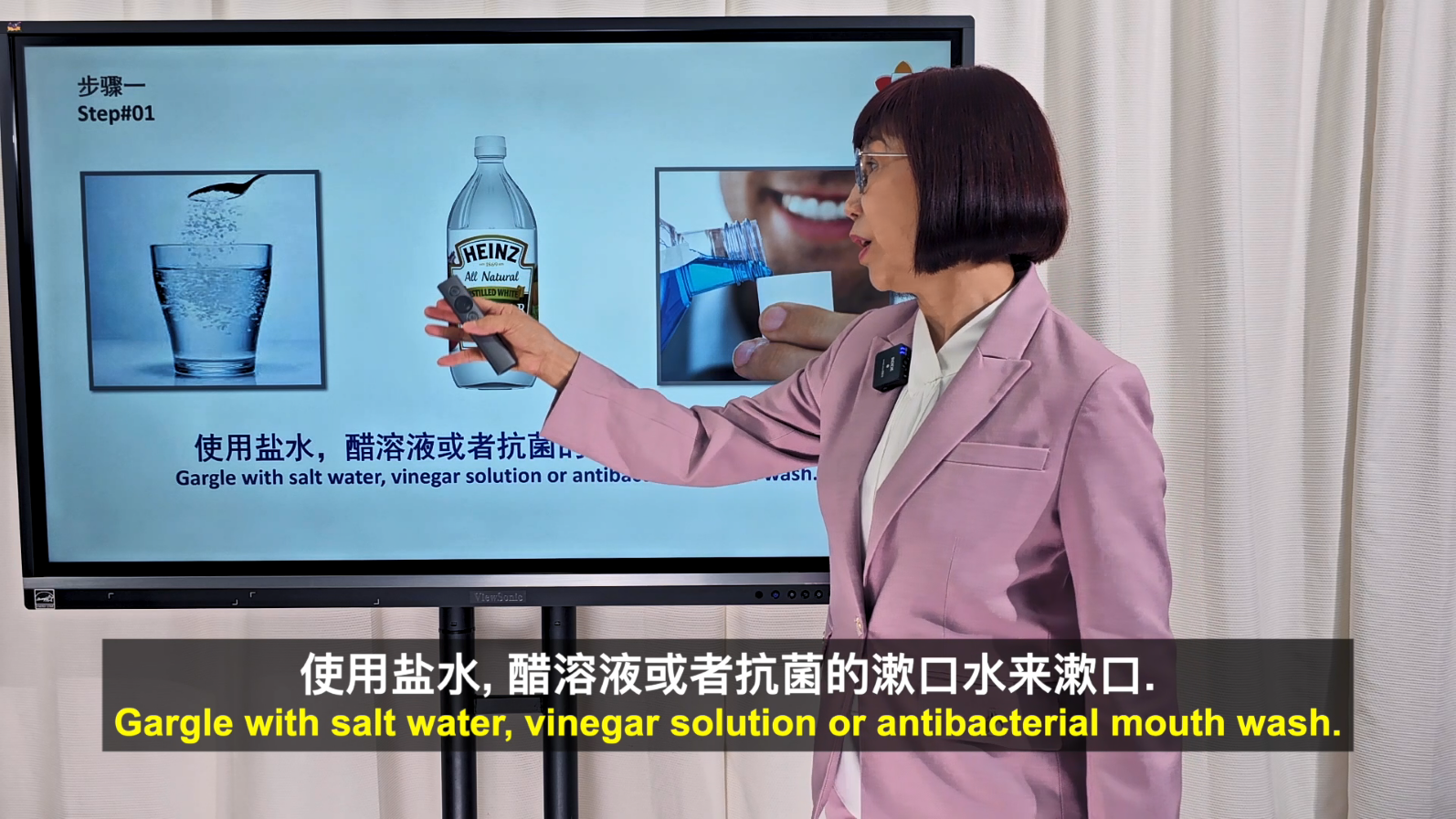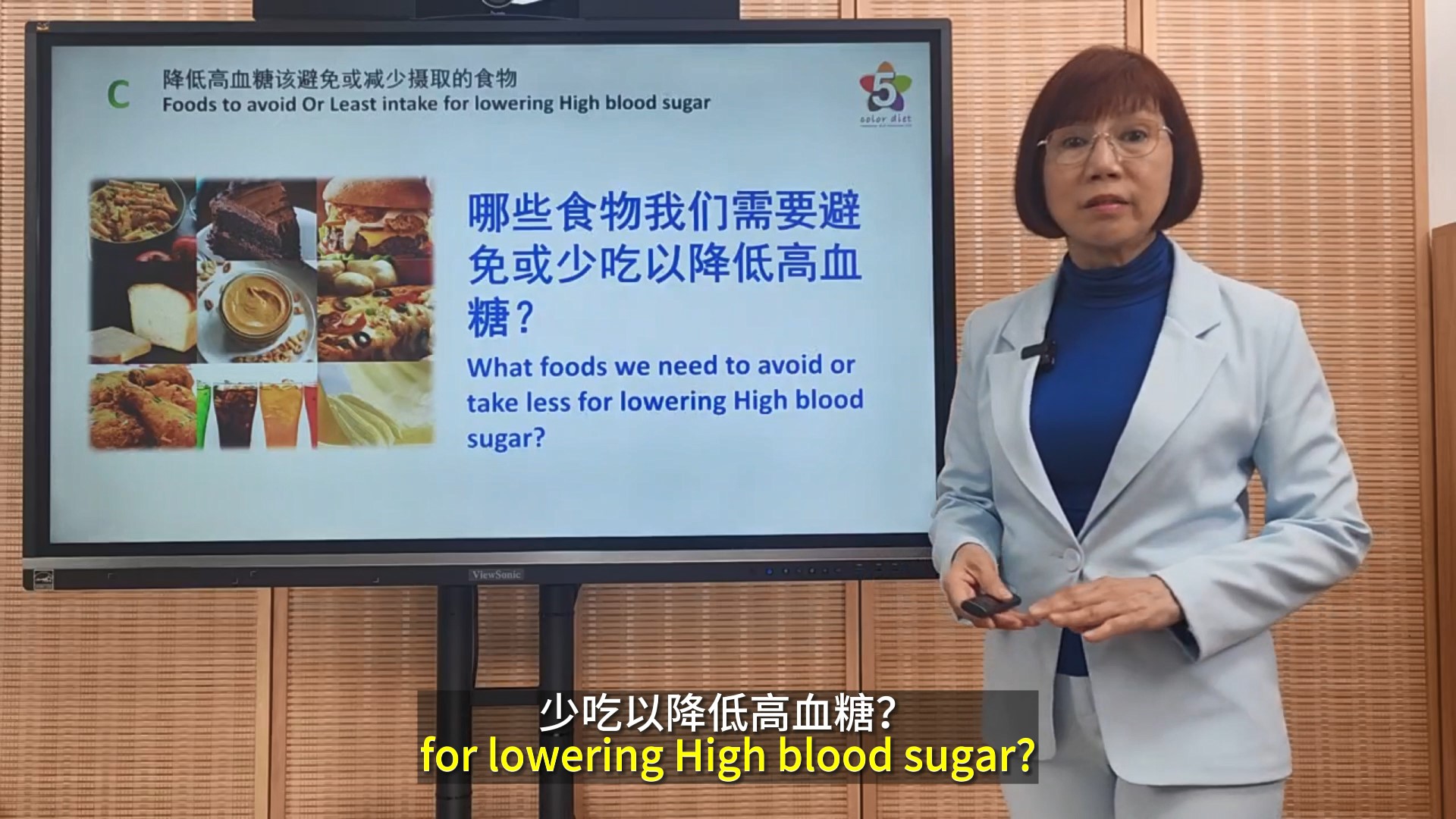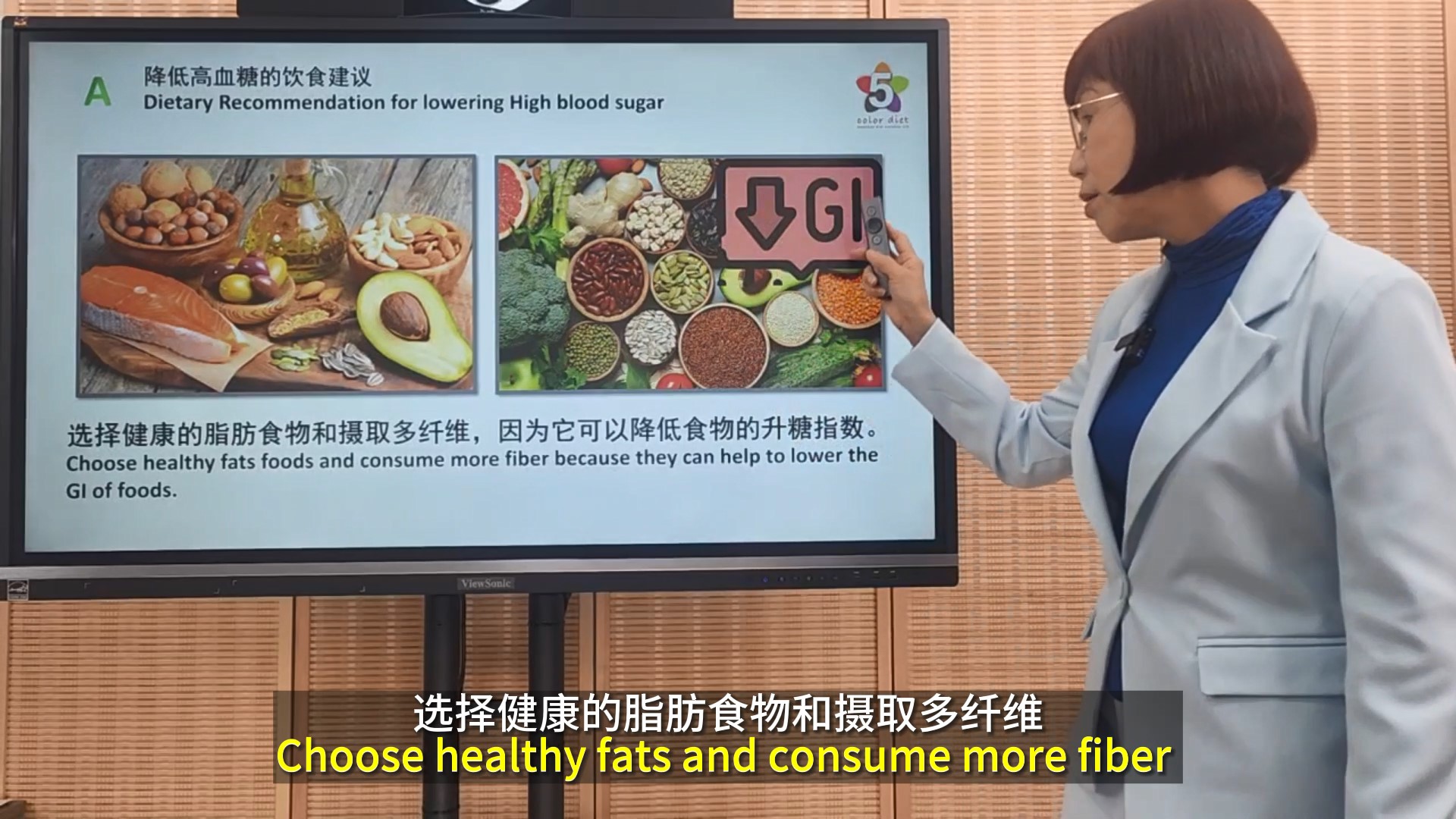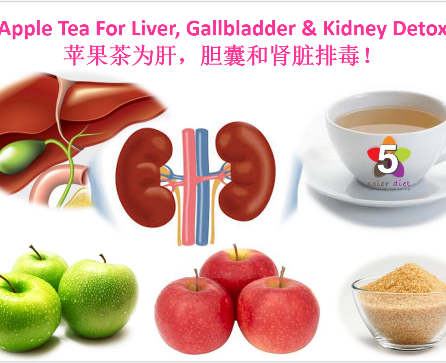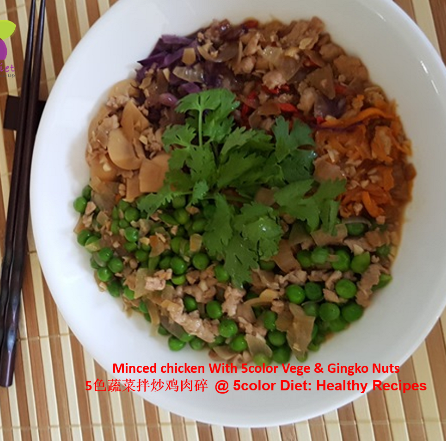
Eyes Problems Overview
The human eye can be compared to a camera which gathers, focuses, and transmits light through a lens to create an image of the environment. Our eyes are vital for seeing the world around us, but vision can be impaired by a variety of medical conditions, as well as the ageing process. Nearly everyone has eye pain or sore eyes at some point. Eye pain sometimes gets better on its own, but it can also be a sign of something more serious.
According to Chinese Medicine, all diseases involving the eyes are closely related to the liver. It is also understood that the eyes are nourished by all of the internal organs in the body. The lens of the eye and the pupil basically belong to the kidney, the sclera to the lungs, the arteries and veins to the heart, the top eyelid to the spleen, the bottom eyelid to the stomach, and the cornea and iris to the liver. The Spleen and Stomach also control circulation in the eyes. Therefore an imbalance in any of the internal organs may lead to eye diseases.
In Chinese Medicine, blurry vision, myopia, floaters in the eyes, dry eyes, or color blindness have been linked to liver blood deficiencies. Liver blood deficiency can be caused by scarring of the liver or anemia. Both of these problems prevent the flow of blood through the liver. Blood from the liver is believed to moisten and nourish the eyes. Bloodshot eyes, pain, and burning sensations in the eyes are linked to liver heat. Liver heat is usually associated with an inflammation in the liver.
The Liver opens to the eyes (sense organ associated with Wood element). Eyesight changes tend to relate to the Liver:
| Symptom(s) | Cause or Pattern |
| Shining and are Clear. | Good vitality of Shen & Jing. |
| Redness and Swelling. | Wind Heat or Liver Fire. |
| Yellow Sclera. | Jaundice. |
| Ulceration or Canthus. | Damp Heat. |
| Upward, Straight Forward, or Sideways Staring. | Liver Wind. |
| Dull or Clouded eyes. | Disturbed Shen, weakened Jing. Commonly seen in drug users and long term emotional problems. |
| Nystagmus. | Disturbance of Liver Wind. |
| Spots in visual field. | Deficiency of Liver Blood or Kidney Yin or Jing. |
| Swelling or dark rings under eyes. | Deficiency of Kidney. |
-
Causes of Eye Problems
● Alcohol.
● Allergy (Animal dander, Dust, Food, Pollen, etc).
● Bacteria infections.
● Diabetes.
● Cosmetics.
● Environmental toxins.
● Haze.
● Lack of sleep.
● Liver problems.
● Migraine headaches.
● Overuse of contact lens.
● Sleep apnea.
● Stroke.
● Sun exposure.
● Viral infection (Conjunctivitis).
● Vision problems eg: blurred vision, cataracts, glaucoma, itchy eyes, macular degeneration, night vision & red eyes, etc.
● Vitamin A, B2 & B6 deficiencies, etc. -
- Symptoms of Eye Problems
-
Recommended Food Sources For Eye Problems
● Aloe juice: It contain vitamins, minerals, amino acids, antioxidants properties which helps to improve vision problems & body’s immune system, etc.
● Barleygrass & Wheatgrass: They contain essential enzymes, vitamins, mineral, etc which helps to prevent the dark circles around the eyes, improve vision & body’s immune system, etc.
● Berries (including Goji Berries): It has antioxidant, anti-inflammatory, collagen-stabilizing, vasoprotective & rhodopsin-regenerating properties which help to improve vision, strengthens eyes’ blood vessels & prevent blockages in the arteries that feed oxygen to the retina, etc.
● Cassia seeds: It contains anthraquinone compounds, cassiaside, mucus, proteins, sitosterol, amino acids & fatty oil which helps to improve eye infections eg: blurred vision, hot eyes, swelling eyes, photophobia, excessive tearing and soothe the nerves, etc.
● Chamomile & Chrysanthemum: They contain flavones & luteolin which helps to clear liver-heat, increase coronary blood flow, reduce capillary permeability and improve vision problems eg: blurred vision, excessive tearing & floaters, etc.
● Coriander: It contains antioxidant properties, Vitamin B1, B3, C, K, Carotene, Calcium, Phosphorus, Potassium, protein, etc which helps to improve vision problems & the nervous system, etc.
● Copper-rich foods (Avocado, Beans, Nuts, Seeds, Miso paste, Mushrooms, Seafood, Tempeh, etc): It has anti-bacterial properties which helps to improve vision problems, etc.
● Gingko leaves & nuts: It has antioxidant properties which helps to improve vision in people with glaucoma & protect eye’s nerves cells, etc.
● Green beans: It contains Carotenoids, Lutein & Zeaxanthin, etc which helps to improve vision problems & prevent macular degeneration, etc.
● Green tea: Its polyphenols helps to protect them from damage from ultraviolet light & vision problems eg: cataracts, glaucoma & macular degeneration, etc.
● Honeysuckle: It contains anthocyanins which helps to by increasing circulation within retinal capillaries, improve vision problems eg: macular degeneration & night vision and preventing retinopathy in diabetic patients, etc.
● Licorice: it has anti-oxidative, anti-inflammatory, antiangiogenic activity which helps to improve vision & liver problems, etc.
● Mulberry leaves: It contains amino acids, beta-carotene, carotenoids, flavonoids, Vitamin A, B1, B2, B6, C & fiber which helps to clear liver-heat, improve blurred vision & strengthen liver, etc.
● Oils (flaxseed & olive): It has essential fatty acids which helps to improve dry eyes, etc.
● Rose buds: It contains antibacterial, antiseptic, and anti-inflammatory which helps to improve gall bladder & liver problems link to age-related vision problem, etc.
● Vitamin A deficiency: Animal livers & kidneys, apricots, beets, dairy products (butter, cheese, eggs, milk, yogurt), fish, fish liver oil, green/ orange/ yellow fruits & vegetables, meat, etc.
● Vitamin B2 deficiency: Animal livers, almonds, asparagus, beet greens, brewer’s yeast, capsicum, cereals, dairy products (butter, cheese, eggs, milk, yogurt), dark green vegetables, fish, legumes, meat, mushrooms, nuts, seafood, sesame seeds, spinach, tempeh, wheat germ, whole grains, etc.
● Vitamin B6 deficiency: Animal livers & kidneys, banana, cabbage, cereals, dark green vegetables, eggs, milk, nuts, potatoes, wheat bran, wheat germ, whole grains, etc.
● Water: Drinking Distilled & Mineral water will helps to remove bacteria, virus, inorganic particles & heavy metals from our body system, etc.
● Wholegrains: It has low glycemic index & contain vitamin E, zinc & niacin which helps to promote eyes’ health, improve gastrointestinal problems & weight management, etc.
● Wolfberry leaves: It contains bioflavonoids, flavonol glycosides, vitamin E, etc which helps to clear liver-heat, improve eyesight and strengthen liver, lungs & kidneys, etc.* Recommendations: Try out our tea recipes: (1) Chrysanthemum, Honeysuckle Licorice Tea (For Cold Body System). (2) Chrysanthemum Honeysuckle Mulberry Leaves Tea (For Heaty Body System).
- Foods To Avoid Or Least Intake For Eye Problems
- Supplementary For Eye Problems
-
Preventive Measures For Eye Problems
● Limit your exposure to the source of allergy to relieve its symptoms. Stay indoors when the pollen count is high i.e. during mid-mornings and early evenings. Close all the windows and run the air conditioner. Do not use a fan as it can draw pollen into the house. Wear eyeglasses to prevent pollen grains from entering the eyes.
● Clean the floors with damp mop. Sweeping tends to stir up the allergens. Replace the rugs and carpet every few years, as they tend to trap and hold the allergens. Opt for blinds, instead of curtains.
● If your pet is causing allergies, then try to keep it outside as much as possible. Do not let your pet share your bed.
● Do not rub the eyes. This will make the symptoms worse. Rubbing the eye pushes the allergens deeper, increasing the problem.
● Limit the usage of contact lenses. Lenses dry the retina, causing eye burn. Spectacles are better than contact lenses. It also protects the eyes from irritation caused due to the computer.
● Do not wear eye makeup if you suffer from any eye problem.
● Red eyes are highly contagious. Do not share your towels, handkerchiefs, pillow case with anyone.
● Avoid sitting in front of the computer, laptops and television for longer period. We tend to blink less often when staring at the computer. This dries out the eyes, causing conjunctivitis.
● The television should be ideally 30 inches away from the body. Take mini breaks, preferably every 20 minutes while watching television. This will lessen the eyestrain.
● Purchase eyeglasses designed to limit the eyestrain from monitor glare. These eyeglasses diminish the glare coming from the computer, preventing red eyes.
● Smoke bothers the eyes, creating unnecessary redness. Buy an air cleaner to keep the house smoke and dust free.
● Do not go overboard on alcohol. Excess consumption of alcohol dehydrates, robbing essential fluids from the body. This in turn causes red eyes.
● Do not use cosmetics that cause eye redness. Eye makeup, especially mascara, eyeliner and eyelash extension can turn the eyes red. Use hypoallergenic products only to prevent eye redness.
● Not resting enough can make the eyes red. Ensure that you get adequate sleep and rest. A minimum 8 hours of sleep is enough to prevent red eyes.Reference: Natural Remedies: Application Uses For Eye Problems












